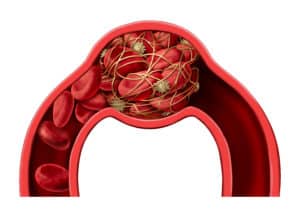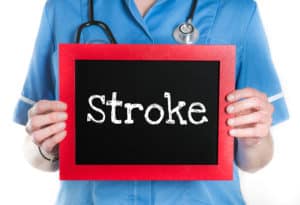Many people have questions about strokes and vertigo. Can a stroke cause vertigo? How are these two related? What’s the difference between them?
Benign vertigo and stroke are very different health conditions. Testing, diagnosis and treatment are all different, too. Let’s explore these two issues.
Can a Stroke Cause Vertigo?
So, can a stroke cause vertigo?
Well, it depends. If a stroke happens in your brainstem (also known as the cerebellum) you may experience vertigo. The cerebellum is the part of the brain that controls balance in the brain.
If this part of the brain is affected by the stroke, you may feel dizziness and loss of balance after a stroke. You may also feel that the world around you is spinning and constantly moving. Very much like symptoms of vertigo.
What Is a Stroke?
A stroke is a serious medical condition where the brain is compromised by blocked or clogged arteries. It’s considered a medical emergency and needs to be treated right away.
In a stroke, damage to the brain starts immediately. And until there is proper treatment, the damage to the brain doesn’t stop. It can cause the brain to lose function within minutes.
Stroke Symptoms
Symptoms of stroke include facial drooping, weakness in one side of the body (particularly the arms and legs) and slurred speech. Other symptoms include nausea, headaches, numbness and vertigo.
What Is Vertigo?
So, what is vertigo? If you haven’t experienced vertigo before, it is a weird sensation. It can feel like the world is spinning around you. Some people mistake it for nausea and dizziness.
Disorders and problems with the inner ear is one of the common causes of vertigo. Damage to the brain (for example, due to a stroke) or the sensory nerve pathways can also cause it. Lastly some diseases such as shingles, syphilis and multiple sclerosis can cause vertigo as well.
More About Vertigo
Vertigo is more of a symptom than a condition.
Most of the time, you may not even notice that you have vertigo. However, there are instances where it is so severe that you may feel the environment around you spin or move.
When the vertigo is severe, it may become difficult for you to balance and focus. Especially when you’re doing everyday tasks.
Usually, vertigo attacks develop quickly. And they only last for a few seconds.
In rare cases, however, they last for longer. Especially if you have severe vertigo. In severe cases, the vertigo may last for several days.
When To Seek Medical Treatment
If you experience persistent signs of vertigo after suffering from a stroke, or if it keeps coming back, it’s best to see your doctor right away. Your doctor will ask you about your symptoms, so it may help to make a list of them. The doctor will also likely carry out some examinations to help you determine different types of vertigo.
Stroke vs. Vertigo
There is overlap between the symptoms of stroke and vertigo. This can often lead to misdiagnosis. And, unfortunately, misdiagnosis can lead to more damage. Sometimes, it can lead to disability or even death if a stroke is not treated soon enough.
Recognizing the difference between the two can help medical professionals determine the best course of action. It can also help them treat stroke right away, which is very important.
Ordering the right tests and getting the correct diagnosis as soon as possible makes all the difference in the world for the patient.








